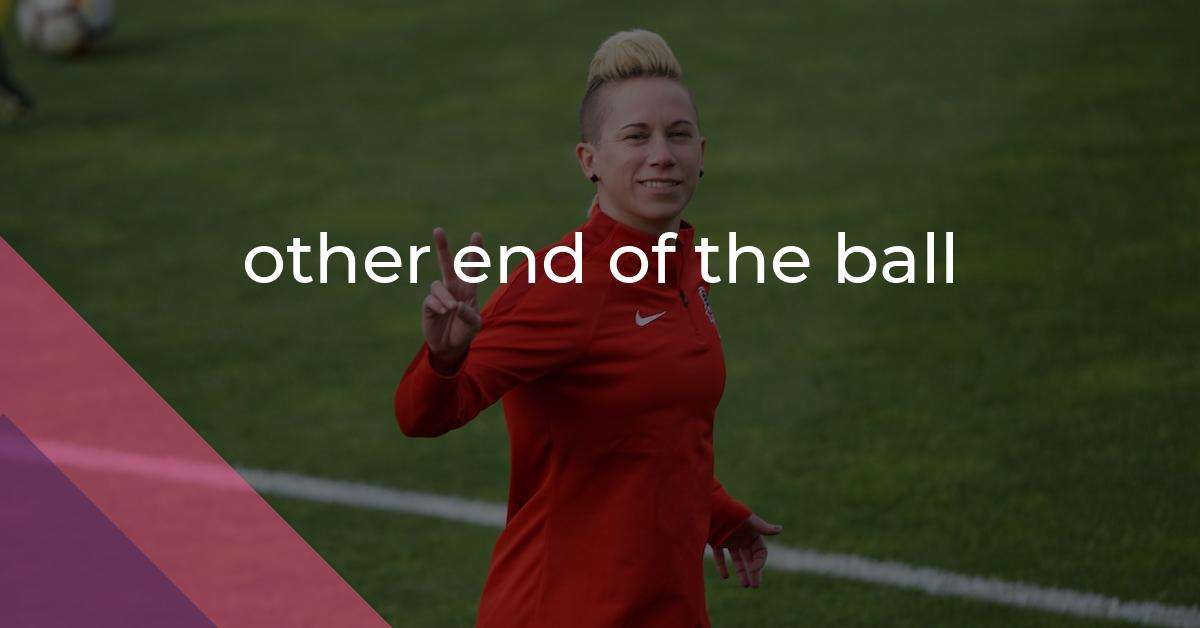other end of the ball: Idiom Meaning and Origin
What does ‘other end of the ball’ mean?
The idiom "other end of the ball" refers to being in a completely opposite or unfamiliar situation or perspective.

Idiom Explorer
The idiom "short end of the stick" refers to being in a disadvantaged or unfavorable position, often due to unfair treatment or circumstances beyond one's control.
The idiom "out of touch" means to be unaware or uninformed about a particular topic or the current situation. It implies a lack of understanding or familiarity with something or someone.
The idiom "out of the loop" means someone is uninformed or lacks knowledge about a specific situation or topic.
The idiom "out of place" means something or someone not in the correct or suitable position, situation, or context.
The idiom "other side" refers to a different perspective, viewpoint, or position on a particular matter or issue. It implies considering alternate opinions or taking into account different aspects of a situation.
The idiom "opposite number" refers to someone who has the same position or job as another person, but works or represents a different group or organization. It is often used to compare or contrast two individuals who are counterparts in different teams or entities.
The idiom "on the wrong side of history" means being on the losing or morally incorrect side of societal progress. It implies that one's actions or beliefs will be judged negatively in the future.
The idiom "on the receiving end" means being the person who is directly affected or subjected to someone else's actions or behavior. It implies being on the receiving side of something, typically negative or unpleasant.
The idiom "on the outside, looking in" means to be excluded or feel excluded from a group or activity, typically observing it from a distance and feeling a sense of isolation or being left out.
The idiom "on the outs" means being in a state of disagreement or conflict with someone, typically resulting in a strained or distant relationship.
Mysterious Origin
The idiom "other end of the ball" is a lesser-known phrase originating in the sporting world. It is used in a figurative sense to describe a completely different or contrasting situation. The phrase "other end" refers to the opposite side or aspect of something, while "ball" metaphorically represents any given situation or circumstance. Therefore, "other end of the ball" signifies an entirely different or contrasting situation or circumstance.
Although not widely used in everyday language, this idiom serves as a colorful and concise way to describe a complete reversal or major shift in circumstances. It highlights the extreme difference or opposition between two situations. Consider the implications and potential scenarios where the phrase "other end of the ball" could be applied. It could describe a sudden change in fortune, such as going from extreme wealth to poverty or vice versa. It could also convey a dramatic shift in perspective, as if one suddenly finds themselves viewing a situation from a completely different angle.
While the exact origin and usage of this idiom may remain shrouded in mystery, its significance in highlighting extreme differences and contrasting situations is clear. The idiom "other end of the ball" offers a concise, vivid, and thought-provoking way to express the idea of a complete reversal or opposition between two circumstances.
In exploring the depths of this idiom, one cannot help but ponder the countless possibilities for its usage and the myriad of situations it could encapsulate. The beauty of such idioms lies in their ability to capture complex ideas with brevity and imagination, leaving room for interpretation and creativity.
When we come across the idiom "other end of the ball," it brings to mind other similar expressions that convey opposite or contrasting situations. One such phrase is "on the other side of." This phrase is commonly used to describe a completely different perspective or viewpoint that contrasts with the current situation. It implies a shift in focus or understanding that highlights contrasting circumstances or ideas. Similarly, the idiom "other side" can be used to express the opposite or contrasting aspect of a situation or circumstance.
Another related idiom is "short end of the stick." This phrase is used to describe a situation where someone receives the least favorable outcome or is at a disadvantage. It suggests an unfair or unfavorable position compared to others involved in the same situation. "on opposite sides of the barricades" is yet another idiom that relates to "other end of the ball." It is used to describe individuals or groups who have opposing beliefs, opinions, or positions. It conveys a sense of conflict or disagreement between two parties who are strongly divided on an issue.
Finally, we have the idiom "on the receiving end." This phrase is often used to describe someone who is experiencing the negative consequences or effects of someone else's actions. It signifies being on the receiving or receiving the impact of something, often in an unfavorable or undesirable way.
Example usage
Examples of how the idiom "other end of the ball" can be used in a sentence:
- He always seems to be on the other end of the ball, scoring goals and assisting his teammates.
- Whenever there's a crisis, she's the one who knows how to handle it, always on the other end of the ball.
- Even though he didn't start the project, he ended up being on the other end of the ball, taking charge and making it successful.
The idiom "other end of the ball" is typically used to describe someone who is consistently involved in a positive or successful outcome, often taking a leading or influential role. It implies that the person is always finding themselves in a position where they are making a significant impact or achieving success in their endeavors.
More "Sports" idioms



